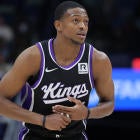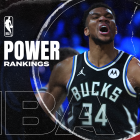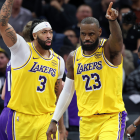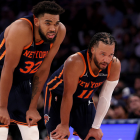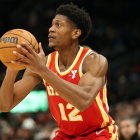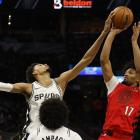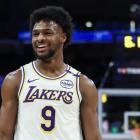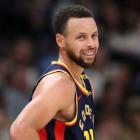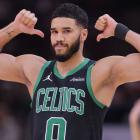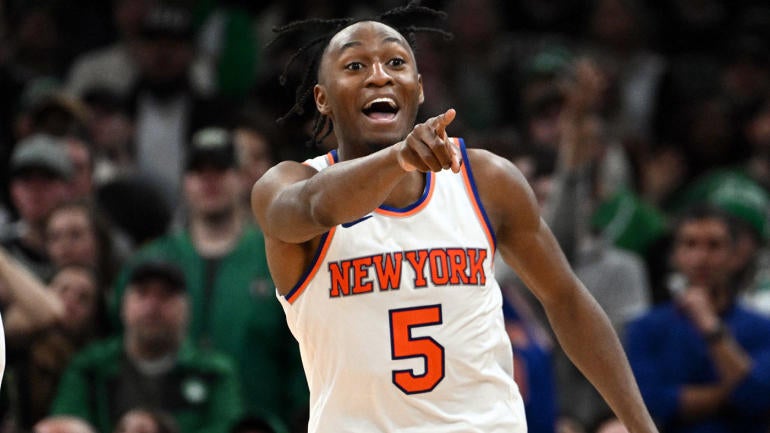
As we've covered frequently this season, the NBA's Sixth Man of the Year award tends to be handed out fairly formulaically. Of the past 17 winners, 10 have simply been the season's highest-scoring reserve. This year's race appeared to be the rare exception, but in a similarly predictable way. Former MVP Russell Westbrook was the betting favorite for most of the season, and while he didn't lead all reserves in points, he did lead them in assists (7.7 per game in 49 bench outings) while leading all reserve guards with 6.1 rebounds per night. Sixth Man of the Year, more often than not, is a box score award.
But once Westbrook was traded, a bit of a vacuum opened. The season's two leading bench scorers both had flawed candidacies. Bennedict Mathurin plays for a possible lottery team, and 19 of the past 20 winners have made the playoffs. Norman Powell plays for the team Westbrook joined, and Westbrook made it clear he still hopes to win the award. At best, that meant both were at risk of splitting the vote. At worst, they'd cannibalize the other's statistics. Suddenly, all of the players we'd typically consider favorites for this award fell out of the running.
Boston Celtics guard Malcolm Brogdon emerged as the favorite after the Westbrook deal. It was a position he held for less than one month. Over the past several days, a surprise candidate emerged as one of the most shocking long shots Vegas has ever seen. In the span of less than a week, New York Knicks guard Immanuel Quickley has emerged as the betting favorite to win the award. Here's how it happened.
The prelude
Westbrook stubbornly held onto the favorite slot far longer than logic dictated he should have. Even as the Lakers were trying to trade him for Kyrie Irving, Caesars Sportsbook had him as the minus-120 favorite with Brogdon right behind him at plus-130. When the dust cleared and Westbrook was a member of the Jazz, Brogdon moved up to favorite status at minus-190. The message was clear: Vegas believed Brogdon was the likeliest winner... but by no means a slam dunk.
As a former high-level starter, Brogdon's volume statistics were bound to take a hit with a reduction in minutes, but his efficiency has more than made up for it. Brogdon is averaging 14.6 points per game, his lowest total since becoming a full-time starter during the 2018-19 season, but his 20.7 points per 36 minutes represent the best figure of his career. He currently leads the NBA by making 46 percent of his 3-pointers, and while he's lost too much foot speed to guard the quickest perimeter players in the league, he makes up for that with excellent defensive versatility. He gave a Celtics team that lacked playmaking last season the sort of stable, veteran floor general that it lacked. For most of the season, Boston had the NBA's best record.
All of this gave Brogdon a strong case. He seemingly strengthened it in his last full game before suffering an ankle injury: a 22-point performance against... Immanuel Quickley's New York Knicks. Brogdon played well individually. Quickley's team won the game, and based on what we're about to cover, he won the narrative of the award as well. Over the week that followed, the Sixth Man of the Year race swung in his favor.
Quickley's ascent
According to The Action Network, Quickley's Sixth Man of the Year odds had sunk as low as plus-12000 by late February. Put more simply: Vegas had so little faith in Quickley's candidacy at that point that a one-dollar bet on him at that point would have yielded a $120 profit.
Why was that? Well, Quickley didn't fit the profile of a typical winner. When Brogdon ascended to favorite status on deadline day, Quickley was the third guard on a 30-27 Knicks team that was fighting to avoid the play-in round. At 12.6 points per game, he didn't come close to the top of the bench-scoring leaderboard. Unlike Westbrook, he didn't fill up the stat sheet elsewhere, and unlike Brogdon, he didn't play for one of the NBA's best teams.
Under the surface, though, an extremely compelling argument for Quickley was developing. As Xavier Justin of Knicks Film School noted on Twitter, Quickley led the other primary candidates in virtually every major all-in-one statistic. He was also, almost inarguably, the most essential to whatever success his team was having. From a net rating perspective, the Clippers get significantly worse when Powell steps on the floor. The Lakers (Westbrook), Celtics (Brogdon) and Pacers (Mathurin) were all roughly even. This shouldn't be held against these players. Remember, when a sixth man enters a game, the team's stars often leave it. The job isn't to build leads, it's to hold them. Nobody told Quickley. The Knicks are 7.9 points better per 100 possession with him on the floor.
Quickley isn't as versatile defensively as Brogdon, but he's far more ferocious on the ball. FiveThirtyEight's Raptor grades him as the NBA's ninth-best defensive point guard, just beneath players like T.J. McConnell and Jose Alvarado, who have earned stellar defensive reputations while Quickley has fallen under the radar. His passing numbers aren't far off of Brogdon's either, as 9.3 percent of his passes turn into assists compared to 9.8 percent for Brogdon, who plays with superior shooters. Brogdon scores more points and does so more efficiently, but he isn't creating his own shot as often, as 53.9 percent of Quickley's field goals are unassisted compared to 50.9 percent for Brogdon.
All of this suggests that the race probably should've been closer all along. It wasn't because Quickley simply didn't look like a typical Sixth Man of the Year winner. He just needed something to shine a bit of light on his candidacy for it to gain any traction. Over the past few weeks, he got it. Quickley didn't play for one of the NBA's best teams prior to the trade deadline, but ever since Josh Hart suited up for New York, the Knicks haven't lost.
That Feb. 27 victory over Brogdon was win No. 6 in the streak. Fittingly, Quickley scored exactly one more point (23) than Brogdon (22) in that game. He followed it up with three marquee wins.
On Wednesday, March 1, Quickley helped the Knicks smack the Brooklyn Nets, 142-118. The Nets are no longer an especially meaningful opponent in the national sense, but remember, prior to the Kevin Durant trade, New York had lost nine straight to Brooklyn. The victory affirmed the new New York hierarchy with the Knicks now on top of the Nets. Two nights later, those same Nets overcame a 28-point deficit to defeat the Celtics, who were missing Brogdon, in what was likely Boston's worst loss of the season.
That morning, Quickley remained an enormous Sixth Man of the Year underdog. Even at Caesars, the book that has been friendliest to Quickley this season, he came in at plus-1200. There were books taking odds as high as plus-3200 at the time. And that's when the money poured in.
By Friday evening, Caesars had Quickley at plus-150. Remember, books do not offer odds based on who they believe will or should win. They do so at odds designed to spread bets equally among as many candidates as possible in order to guarantee a profit. This theoretically creates a problem when candidates like Quickley, who had previously been enormous underdogs, start to mount real cases. The books have a number of outstanding tickets that would pay enormous profits, so they need to move lines in a way that will discourage more betting on that candidate. The problem, ironically, is those shifts in odds can scare bettors into putting more money on that player for fear of missing out on opportunities that will soon be gone. This can create a bit of a feedback loop. That is one possible explanation for how Quickley's odds moved so drastically in such a short amount of time. Once the basketball world noticed what he was doing, it moved quickly to profit from it.
Quickley helped them out on that front. His next game after the great shift was a comeback road victory over the Miami Heat. Quickley's 21 points and five 3-pointers were essential to the victory, but Julius Randle's 43 and game-winning jumper got the press clippings. On Sunday, however, Quickley got to take center stage, and it came, once again, against Brogdon's Celtics.
With Boston at home and Jalen Brunson out, Boston entered the game as heavy favorites. That felt justified as the Celtics built a 14-point lead. But the Knicks, behind a team-best 38 points from Quickley, erased that deficit. They took the game to double overtime and won. Quickley, starting in Brunson's place, played 55 of the 58 total minutes. It was the most minutes any player has played in a regular-season game since four Raptors played at least 56 in a triple-overtime game against the Miami Heat in Jan. 2022. Brogdon missed the game with that same ankle injury.

CBS Sports HQ Newsletter
Your Ultimate Guide to Every Day in Sports
We bring sports news that matters to your inbox, to help you stay informed and get a winning edge.
Thanks for signing up!
Keep an eye on your inbox.
Sorry!
There was an error processing your subscription.
The state of the race today
Sunday was the marquee performance Quickley needed. After the game, Caesars officially made him the favorite at minus-220. Brogdon is back in the plus-money territory at plus-135. If you include preseason favorite Jordan Poole, we are now on our fourth favorite of the year for this award.
That should tell you that Quickley has not seized the trophy yet. Brogdon will seemingly return to the lineup soon, and his presence will be welcome for a team that just lost two embarrassing games without him. As of this writing, Boston has slipped two games behind the Milwaukee Bucks for the No. 1 seed in the Eastern Conference. If Brogdon helps them reclaim that top slot, it will only strengthen his case. New York, meanwhile, has not only entrenched itself as an Eastern Conference playoff team but, with this nine-game winning streak, has moved within a single game of the No. 4 seed, which is currently held by the Cleveland Cavaliers.
When the Knicks last earned a No. 4 seed in 2021, they took home two major awards: Coach of the Year for Tom Thibodeau and Most Improved Player for Randle. Derrick Rose was also a finalist for this very trophy. Ultimately, team success is going to be Quickley's path to the award. As we've covered, he doesn't have the typical statistical profile of a Sixth Man of the Year, but as he's proven lately, he's not going to need one if he's powering the NBA's hottest team. If the Knicks keep this up, Quickley is probably going to win the award, and in the process, he's going to remind voters and bettors alike of the importance of looking behind the typical outline of a Sixth Man of the Year winner when seeking candidates.










